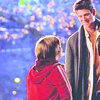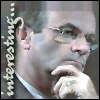Post by boxman on Mar 13, 2007 4:39:29 GMT -5
naj said:
I found this episode extremely corny. I don't know if it was the theme of Footloose type story but I just thought the whole grocery store bit was ridiculous...tvfan said:
First off, I thought that the grocery store scenes were too corny as well. There's no way that Maurice would have risked his father or his father's customers catching him dancing in the aisles. It all felt a little family film of the week for me where all sense of reality is thrown out the window for a good, clear message. Not that I dislike that sort of entertainment, but I expect more realism from CC.Well, keep in mind those "corny" grocery store scenes came from that pompous Dr. Leroy's flashback. What else can you expect from an egomaniac like that??

teledetective said:
I'm pretty sure the dances in the episode were symbolic of something, though. Anyone know what they are and what stories they could tell?One interpretation I'd make is that Dr. Leroy's dance is meant to point out the irony that no one questioned those male dancers' masculinity, unlike how Maurice's masculinity was questioned.
During the 1980s, "I Want to Know What Love Is" was played heavily on both MTV and VH1:
In the original music video, at the moment of the song where Dr. Leroy is dancing, there's an imagery of a construction guy carrying a metal beam while walking on the edge of a high-rise building. Even though it's probably been over a decade since I've seen the music video, I can still remember it because it's seared in my mind as one of the most depressing images I've ever seen in a music video. But on Cold Case, Dr. Leroy's dance is uplifting as he reaches upwards at the end. I liked that. To me it said that "life goes on" as there's been some closure to the questions surrounding Maurice's disappearance and death. So while the original music video shows how people can feel like there's a world upon their shoulders, I'd interpret Dr. Leroy's dance (and especially his impressive pose at the end) symbolizes Catharsis -- a 'cleansing of the soul' and renewal for living life after witnessing or participating in a tragic series of events.
I can interpret Maurice's dance at the end of the episode in this way: Maurice's case is solved, so the light shining down on him from above is his cue that he can leave this place for the "afterworld". I'm sure you can think of other religious/spiritual ideas of the significance of him facing upwards with arms stretched open, and the white light shining down on him...
lillykat said:
...I think I have a sentimental soft spot for Liz Garcia’s scripts... And the more I think about this episode, the more I think of how talented she truly is. I'm disappointed that this episode is getting a lot of "It was OK" votes. As this board has much more women than men, I hope that it's not because people were having difficulty understanding the unique relationships fathers have with their first-born sons.
And the more I think about this episode, the more I think of how talented she truly is. I'm disappointed that this episode is getting a lot of "It was OK" votes. As this board has much more women than men, I hope that it's not because people were having difficulty understanding the unique relationships fathers have with their first-born sons.Sadly, I think it's too often that fathers forget the "relationship" part of the term "father-and-son relationship". Like in this episode, many fathers want to see their sons become successful adults. They urge them to be competitive, to make goals and set objectives, to think strategically, to win medals, and so forth. People outside of this can easily assume that there's a close bond that forms between fathers and first-borns because of this, especially when the son is showcased like how Grant was. And yet that can be such a big, mistaken assumption to make. At worst, fathers pressure their boys out of an urge to relive their childhood through their son's childhood. They want to see the kids "grow up the right way", so to speak, out of their own failings. In this episode its something different. Pat is a father who's unable to show his emotional side, and simply finds it hard to tell his sons, "I love you". Ironically, he can express his pride in public on the store's sign for everyone to see ("Hall & Sons' Grocery Mart"), yet he couldn't tell them face-to-face what he felt.
koufax said:
...the dancing scenes at the end seemed to be a filler for lack of more of a storyline. (i.e. more dialogue)And that's how guys are. Little or no Dialog. Many times things just aren't said because its understood, so I thought it was fine the closing montage lasted as long as it did. For example, Maurice never told his dad that it was Grant who punched him. And Grant understood that Maurice loved him because he kept his mouth shut about the incident. In another example towards the end of the episode, Grant talked about his dream where he gives Maurice a ticket to NYC. He'd give Maurice his "Big Brother Look" to tell him to forget about him and his dad, and to go on and pursue his dreams. An finally, an even more tragic example is when Grant emerges in handcuffs. I could clearly see (in both young and old Grant) the expression on his face saying, "Dad. I'm sorry. I let you down", and Mr. Hall saying in return, "I should have told both of you how much I loved you both." Those things to me didn't need to be verbalized; Guys understand from just "the Look". (And speaking of "sports, beer, girls", think of all those Budweiser commercials a few years back, where the guys say nothing but "Wassup" or "True"...
 )
)Carlos used a unique Spanish phrase: "Mano-a-Mano". I was surprised to find that it doesn't strictly mean "Man-to-Man" nor "Man versus Man" as I thought it did. Instead, the phrase has a subtle nuance associated with it. In Spanish, Mano-a-Mano "describes any kind of competition between two people where they both compete, but somehow cooperate in achieving something".
But the lack of dialog Koufax bring up is exactly the thing that breaks down the mutually beneficial "Mano-a-Mano" relationship that competitive fathers have with their sons. Like Grant, some sons naturally become fearful of failure and can't express this to their dads. Then the cooperation quickly becomes competition, leading to destruction.
riche said:
I was a bit curious over Kat's looking at the missing poster at the end. Maybe there is something there.THAT was incredibly clever to me. As this show is about Lilly Rush, the writers like to touch upon the theme of the "liberated, independent woman". For centuries, fathers pushed their first-born sons to become the butcher, baker, and candlestick maker that they are in order for the sons to inherit the family business. But now that women also have careers, do they too risk destroying the "Mano-a-Mano" relationships with their daughters as well?? Remember that Kat's daughter Veronica is a dancer, like Maurice. Is Veronica a dancer because that's what she likes doing?? Or is Kat pressuring her to perform, much like how Mr. Hall had pressured Grant to achieve in wrestling??
Because more women have professions these days, the changing roles and relationships that Mothers have with their "first-born daughters" is something to think about too. I saw that in Kat's look at the end of the show; as if meeting the Halls gave her something to think about her own family. And that's why I hope this episode isn't getting "It was OK" votes because it was so guy-centric. I think this issue is now starting to concern parents of both sexes.
The image of Grant mopping the floor at the end of the episode (as well as his mention of a haunting dream) is clearly an allusion to Shakespeare's "Macbeth". In the classic tragedy, a character washes imaginary bloodstains from her hands because of all the guilt on her mind. Grant was mopping the exact location in the store where he killed Maurice. (This also bears a slight similarity to Edgar Allen Poe's "The Tell-Tale Heart".)
Dr. Leroy asks the students to tell Maurice that this was a dance class and not a "steel mill". That was an obvious reference to "Flashdance", where Jessica Beals' character is steelworker.







 I have an older brother and I think back even up to the time of my father's death that unexpress feeling of love and not much dialog btwn them.
I have an older brother and I think back even up to the time of my father's death that unexpress feeling of love and not much dialog btwn them. 



 ..........
.......... ..........
.......... ...........
...........









